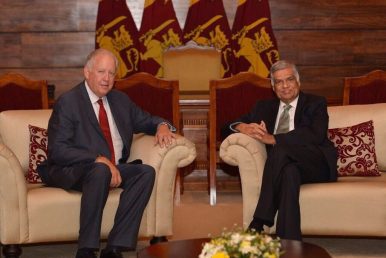Washington’s current approach actually discourages reform.

US Under Secretary of State Tom Shannon & Sri Lanka PM Ranil Wickremasinghe December 2017. Photo courtesy US Embassy in Sri Lanka.
by Taylor Dibbert, ‘The Diplomat,’ Washington, DC, December 6, 2017
The U.S. and Sri Lanka recently held their second Partnership Dialogue. The first took place in Washington, D.C. last year. This one was held in Colombo. The meeting didn’t seem to feature any big surprises – which means that it was a missed opportunity for U.S. foreign policy.
The predictable joint statement deals with trade, aid, economics and maritime security, among other topics. It’s about emphasizing how robust U.S.-Sri Lanka ties are at this point and ignoring what’s really happening in the island nation.
There are also references to rights, justice and the UN Human Rights Council resolution that Sri Lanka cosponsored in 2015. “Sri Lanka and the United States recalled their co-sponsorship of a resolution at the United Nations Human Rights Council in March 2017, reaffirming Sri Lanka’s commitment to promote reconciliation, accountability, and human rights in pursuit of lasting peace and prosperity.”
Regrettably, a lot about the joint statement – including the abovementioned words – aren’t remotely connected to reality. To begin, Colombo is committed to neither reconciliation nor accountability (for alleged wartime abuses). And, Sri Lanka is obviously insincere about that Human Rights Council resolution; in fact, Colombo has spent the past two years largely ignoring the commitments pertaining to it.
The joint statement also mentions that “[b]ilateral security sector cooperation continues in parallel with Sri Lanka’s ongoing reconciliation, rule of law and judicial reform efforts. This also includes U.S. support for demining, joint military engagements, human rights training of Sri Lankan officers, and visits by ships and military officials.”
At the dialogue, remarks made by U.S. Under Secretary of State Thomas Shannon were disappointing as well. “Today is a great day for the U.S.-Sri Lanka relationship. As the government of Sri Lanka moves ahead with its reforms to promote justice, accountability, reconciliation, and human rights, the United States will continue to partner with Sri Lanka to foster economic development and advance equal rights and opportunities for all persons in this great nation,” Shannon noted.
Nearly three years into President Maithripala Sirisena’s tenure, American officials seem unable to accept reality or reconsider U.S.-Sri Lanka ties anew. Colombo is deeply unserious about reconciliation; we know this because even smaller efforts to reach out to ethnic Tamils haven’t happened. More generally, rather modest reform benchmarks are not being met.
Furthermore, the flurry of increased U.S.-Sri Lanka security cooperation is an especially bad idea—because such activity ensures that legitimate security sector reform won’t come any time soon. Recent Associated Press reporting has reiterated that sexual violence and the torture of ethnic Tamils continue to be big problems. (The alleged perpetrators are Sri Lankan security personnel.)
It’s good that the increasingly authoritarian Mahinda Rajapaksa lost the presidency in 2015. But Sirisena’s administration shouldn’t be able to rely on relativism, fears of a Rajapaksa resurgence or false promises and continue to be celebrated by countries such as the U.S. The reality is that Sri Lanka’s reform agenda is in shambles.
In terms of American policy, heightened pressure over human rights and governance issues may come from legislators on Capitol Hill. That’s undoubtedly vital but, absent new ideas and changes from the Trump administration, congressional pressure alone may not matter all that much. Besides, this isn’t about tinkering at the margins of the U.S.’s existing bilateral framework. What’s sorely needed is a bold re-examination of how best to engage an administration in Colombo that’s fallen remarkably short of expectations.
In recent times, Western appeasement and American bear hugs have not encouraged reform in Sri Lanka. Continuing with the current approach is bound to produce similar results.
*A version of this piece first appeared in The Washington Times. It has been reprinted here with kind permission.